Over the past few days, we considered healthy lifestyles and how as believers we can present our bodies to God as a healthy living sacrifice. We saw that we are God’s temple and the Holy Spirit dwells within us and as such, we should not mishandle our physical well-being. We shall continue the conversation of a healthy lifestyle this week and consider ways we can spur our others to live purposely to achieve a healthy Christian lifestyle. Most times, we tend to consider achieving a healthier lifestyle on a personal level. There are very few messages on healthy lifestyles in church. For some Christians, the focus is Spirituality and nothing about their well-being matters. These people miss the point: to be healthy is not just a physical state but a spiritual transformation. If your spiritual state is sickly, it affects your general well-being.
Whenever we go through bouts of emotional and psychological issues, we tend to weaken physically. Many people develop health problems after an emotional or psychological impact. There are many weak and sickly people in the church who look strong on the outside, but their physical strength is being zapped by pains and worries that could be met by the church (institution). What we do not know is this: “Do you not discern and understand that you [the whole church at Corinth] are God’s temple (His sanctuary), and that God’s Spirit has His permanent dwelling in you [to be at home in you, collectively as a church and also individually]?” (1 Corinthians 3:16 AMPC) Individually and collectively we are God’s sanctuary and individually and collectively, God’s Spirit dwells in us.
If anyone destroys God’s temple, God will destroy that person; for God’s temple is sacred, and you together are that temple. (1 Corinthians 3:17)
When we understand that the temple of God is both an individual and collective institution, we will be more concerned about one another. When we tend to neglect others in their lowest point, we destroy the temple of God (collectively as a church). And this is the verdict: “If anyone destroys God’s temple, God will destroy that person; for God’s temple is sacred, and you together are that temple” (1 Corinthians 3:17). Therefore, “let us consider how we may spur one another on toward love and good deeds” (Hebrews 10:24). One of the ways as a church we can collectively do that is to open our doors for counseling, make room for seminars on wellness and healthier lifestyles and encourage others to take care of themselves. Recently, the men’s ministry in my church had a health talk and I learnt so many things about men’s health. Promoting and awareness of healthier lifestyles is important for the general well-being of the body of Christ.
The women’s ministry in my church has a plan for a physical activity and I hope to join this healthy fun activity. What plans does your church have to promote healthy lifestyles?
Don’t destroy God’s temple!
To be healthy is not just a physical state but a spiritual transformation. If your spiritual state is sickly, it affects your general well-being.






